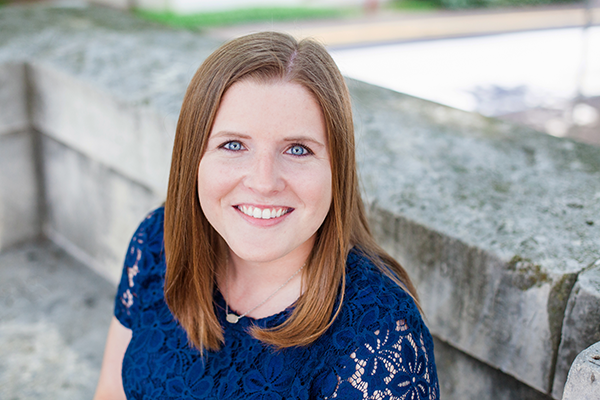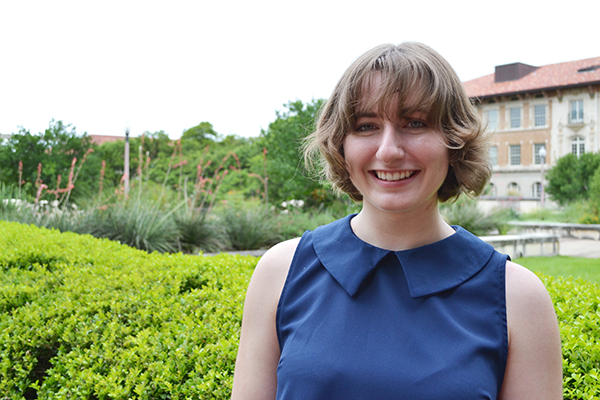Graduating seniors Danielle Brown and Olivia Migacz have been selected as the first recipients of the Randy Diehl Prize in Liberal Arts.
The award was established by liberal arts donors to support a graduating senior who is committing the year after graduation to service for the greater good, be that through work for a nonprofit organization, a for-profit organization that benefits the others, or through the creation of a new nonprofit organization.
“The intent behind this gift is to encourage liberal arts graduates to use their considerable skills in communication and understanding of other cultures, histories, philosophies and literature to effect a positive change in the world,” said the prize’s founding donors.
A faculty search committee appointed by Dean Diehl narrowed down the applicants to a small group of finalists. Dean Diehl shared the finalists’ applications with the donors to show them the impact that their gifts could have. Two candidates so inspired the donors that they elected to contribute additional funds to award two $13,000 prizes. Read more about Brown and Migacz and their upcoming years of service below.

Olivia Migacz is an English and UTeach-Liberal Arts alumna from Grand Prairie, Texas. She has committed to Teach for America for two years and will teach English language arts and social studies at a charter school in Springfield, Massachusetts, beginning in August.
What impact does receiving this award have on you?
Receiving this award lifts an incredible weight off my mind, as I worried about my finances with moving across the country and paying back student loans. The Randy Diehl Prize has a positive impact on my future as I begin my teaching career and can focus more of my time on my students, and less on my financial situation.
How has studying the liberal arts influenced you?
Studying the liberal arts allowed me to explore my vast interests – from reading works by female authors in my Women’s Autobiographical Writing course, to learning about cultures around the world in my Cultural Anthropology class. In my four years in the College of Liberal Arts, I was able to engage in literary discussions, further my knowledge of various subjects and hone in on my writing skills.
One of the most important ways that the liberal arts impacted me was through the UTeach-Liberal Arts program, where I grew and developed my teaching skills, as well as gained a close-knit cohort to confide in and learn from.
What was your experience as a UTeach-Liberal Arts student like?
UTeach-Liberal Arts is an outstanding program for anyone interested in obtaining their teaching certification. I was able to teach a variety of grade levels during my time at UT and develop my teaching skills as I gained more experience. The final semester in the program, the student teaching semester, impacted me the most as I spent twelve weeks at the Liberal Arts and Science Academy teaching two English classes of bright, sharp students who challenged me and helped me grow.
UTeach gave me a cohort always willing to lend their knowledge and positive vibes, a professor always available to give advice, and a cooperating teacher always ready to help me in any way she could. UTeach-LA laid the foundation for what kind of teacher I hope to be, and provided me with the educational tools and mindset I will need in the classroom.
What made you want to teach?
I knew I wanted to teach after a summer working with a nonprofit, Breakthrough Austin, whose mission and goals I align with so well. Breakthrough assists students on their path to becoming first-generation college graduates. As a first-generation college graduate myself, I couldn’t have found a better group to work alongside.
In the summer of 2014, I taught eighth grade English language arts. Nervous at first to teach Shakespeare, I worked with our team and helped make Shakespeare’s language and themes relevant to our eighth graders. Our students were challenged and worked thoroughly to perform scenes from The Taming of the Shrew at Shakespeare at Winedale. After my students’ performances, I was filled with happiness. I knew that despite the challenges I faced throughout that summer, seeing the culmination of my students’ hard work was so rewarding, and I knew that this was what I wanted to do.
What made you want to be a part of Teach for America?
Teach for America’s mission is straightforward: all students deserve an equal education. I believe in Teach for America’s goals, and I’m excited to teach alongside people who are dedicated and passionate about working with students. I discovered my love for teaching after working with Breakthrough Austin, and I knew I wanted to surround myself with like-minded educators focused on educational equity after I graduated.
What was your most memorable moment at UT Austin?
Although my most memorable moment occurred recently, it’s one I will always remember. Surrounded by friends and fellow Longhorns, I felt such joy and pride as the fireworks at the University-wide Commencement lit up the Tower. The feeling was incomparable, and such a wonderful way to wrap up my time as an undergrad.

Danielle Brown is a Rhetoric & Writing alumna from Austin, Texas. This summer she will be moving to Bangkok, Thailand, to work as a volunteer and teacher for the nonprofit organization Courageous Kitchen, which aids asylum seekers in the country.
What impact does receiving this award have on you?
Before receiving this funding, I knew I was going to move to Thailand and I knew I wanted to volunteer, but I was struggling to financially make it work. I initially was only going to be able to stay for about three months before having to come back to the U.S. This upset me because I wanted my volunteer efforts to have a long-term impact, rather than just providing temporary aid.
Receiving this award was truly life changing. I’m now able to plan to stay in Thailand for a full year, and really focus my efforts on sustainability and connecting with the local community so they can continue to support the asylum-seekers for years to come.
What is Courageous Kitchen?
Courageous Kitchen is a non-profit in Bangkok, Thailand, that serves the asylum seeking community there. Courageous Kitchen has three main focuses: to help rehabilitate and provide basic needs to survivors of torture and trauma, to build esteem and confidence among women who have experienced trauma and to create educational opportunities for all ages. All of these are coupled with education and skill training, with the aim of creating income and job opportunities for those who can’t obtain work status in Thailand.
What was your previous trip to Thailand like?
Thailand is an incredible country. It’s beautiful and it’s extremely hot and humid. I had an amazing time while I was there in 2014, and I’ve known ever since I’ve wanted to go back.
I got involved with Courageous Kitchen after meeting its founder, Dwight Turner, during my trip. He was actually the English teacher of a friend of mine who grew up in Thailand and has been working with the refugee community since 2008. My friend and I went over to visit some of the kids supported by him and they had so much energy! They were so much fun. I knew after spending time with Dwight and the kids I wanted to return to Thailand and volunteer. They really have such a special community there, and I knew I wanted to be a part of it in some way.
I think it’s incredible one of the main pillars of the organization focuses on “fun,” and it really showed through the sense of joy the kids have. I mean these families have gone through so much, and just reintroducing fun into these women and children’s lives can have such an impact.
What will you be doing when you return to Thailand?
Dwight has this amazing goal of creating a “refugee workforce” by teaching skills the asylum-seekers can use to generate sustainable income. I hope to join in this effort by teaching different technical skills, as well as English. I hope to be able to teach these skills and develop a curriculum that local volunteers can continue to teach from. I also want to use my time there to learn from my experience, especially from teaching, to carry-on into graduate school and my future career.
What are your plans following your year in Bangkok?
I plan to apply to education graduate programs so I can continue to work with English Language Learner students, as well as research English language curriculum development with a focus on Southeast Asia.
How has studying the liberal arts impacted you?
In a broader sense, studying liberal arts has taught me how to be a globally mindful citizen in a globalizing world. When I entered college, I had a narrow view of higher education – I was pursuing a degree to serve me. But after studying liberal arts, I now think, “How can I use my higher education to serve others?” By shifting perspectives, I’ve grown as a person. I’m looking forward to carrying the knowledge and skills I’ve gained at UT into my work as a volunteer.
More specifically, through my classes and working with faculty and peers, I’ve learned about pedagogical methods, how to conduct research projects, and quite honestly to question everything.
What was your most memorable moment at UT Austin?
While working at the University Writing Center this past semester, I worked with an English Language Learner student who wanted to go over a few grammatical concepts he was struggling with. After I showed him a few example sentences demonstrating the grammatical concept, the student started looking for the grammar issue in his own writing, and he was able to identify them and correct them on his own. It was amazing seeing that “light bulb” moment for him. That moment stood out to me because I felt like the student was so much more confident in his writing after our consultation, and he walked away so happy – he shook my hand and thanked me for working with him at least a dozen times. As a writing consultant, it was inspiring to see a student walk away so grateful and happy.
What do you like most about teaching?
I love using “edutainment,” or using entertainment to educate. By helping students learn and having fun in the process, I feel starts this kinetic energy in students — this forward moving motion in students, so they want to continue to learn and absorb knowledge.
Also, I like to approach teaching as more like facilitating. I want to be a facilitator between knowledge and the student. There are all sorts of methodologies and approaches to education, but I like to take an approach that engages the student in critical thinking, but also strengthens their autonomy through learning.